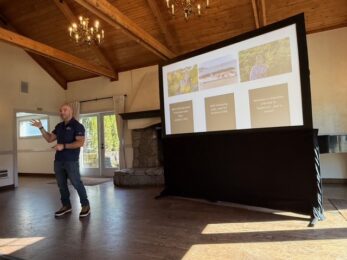How to thrive in a post-10-percent-commission, virtual-meetings-obsessed, experience-demanding reality
In January, Marriott International Vice President of Global Sales Tammy Routh hit “send” on an email that rocked the meeting planner world. Her message announced that the largest global hotel brand would cut commissions to independent planners by 30 percent. It was the start of a series of such announcements—Hilton Worldwide followed in March and Intercontinental Hotels Group in May.
Brian King, global digital officer at Marriott explained to Smart Meetings in an exclusive interview in June that after the merger with Starwood Hotels and Resorts, he sees the brand as an even stronger partner, offering the largest collection of gathering places in the world with experts in their markets to partner on creating experiential activities. “We want to move from conversations about rates, dates and space to co-creating events,” he said. “But the economics have to work—the business model has to make sense for both sides.”
The hit to the prevailing independent planner business model was part of a wave of tremors already shaking up the industry.
For one, virtual technology has long threatened to make face-to-face meetings irrelevant. And today’s attendees have also become increasingly and visibly restless with the standard meetings paradigm of being lectured to in a blank conference room until the buffet is rolled into the ballroom. At the same time, many event professionals have struggled to demonstrate—really prove—the ROI of their efforts in helping to achieve company goals.
The pressing question is, “What’s next for planners?”
The good news is that all this disruption is also an opportunity to reposition what event professionals do as valuable, rather than as a “free” service that comes with the price of booking hotel rooms. It is also a call to action for planners to hone skills to engage the audiences who will fill the seats in theaters and breakout sessions the remainder of this decade and into the future.
We know independent planners are busy running their businesses, managing everything from marketing and cash flow to human resources and long-term planning. So, we decided to take the “what’s next” question off your plates. In a deep dive for answers, Smart Meetings has surveyed industry experts to harvest their tips on how to adjust to a brave new meetings world. Our goal was to make a positive contribution to the current dialogue about how adjusting to today’s altered reality will not only enable you to survive, but to thrive.
A Transparent, Improved Business Model
Tracey Smith, executive director of Senior Planners Industry Network (SPIN), described the announcement that commissions would go from 10 percent to 7 percent as a wake-up call. “The commission cut was a slap in the face, telling us that we need to go back to those relationships,” Smith said.
She suggested independent event professionals work to improve their focus on basics, such as marketing, legal and financial issues—things that may not have been their core competency but may now be essential to staying independent.
Options Smith suggested to planners for making up shortfalls under the reduced commission structure include:
- Partnerships: CVBs and hotels can often offer rebates or other revenues to offset the reduced commissions
- Pricing: Planners need to confidently and transparently price their services, so that commissions are a minor source of revenue, if a source at all
- Forecasting: Planners need to be able to accurately forecast their revenue for the short-term and long-term, based on business trends and world economics (SPIN will be offering webinars and session on these topics and other that can help make the adjustment easier)
Adding Value
Kelsey Dixon, co-founder of Davies and Dixon (see sidebar “Like a Boss”), said that she and her partner are constantly evaluating and evolving the work they are doing. “We have a strong dedication to education—not always in the traditional sense,” she said. Her team members attend seminars, sessions, events and conferences, but they also build creative brainstorming into their weekly schedule with a “growth topic” every Monday morning—to discuss trends and how they might be able to incorporate advancements into their daily work.
Meeting Professionals International (MPI), which has long included entrepreneurship courses as part of its web-based education, recently launched Independent and Small Business Owners Community, and offers discounts to independent planners on MPI Academy certificate courses. It also discounted registration for 2018 World Education Congress in Indianapolis in June, which included sessions on topics such as Identifying Solutions to Buyer and Seller Relationship Challenges.
A new industry group, Meeting Planners Unite (MPU), is also coaching independent planners on ways to develop new revenue streams. Options include finders’ fees from nonhotel suppliers—audiovisual companies, exhibit and transportation companies, and possibly destinations. MPU Executive Director David Bruce estimated that his members control $125 million in room revenue each year. He hopes to leverage that economic power to negotiate better terms for members and demonstrate to the industry the value of the planner role.
Mike Dominguez, senior vice president and chief sales officer for MGM Resorts International, who spoke at WEC and Smart Meeting West National Event in June, explained why his company would not be reducing commissions. “Relationships still matter. We’ve been working with our partners to make it work for both of us,” he said. At the same time, he suggested that negotiating commissions beyond lucrative hotel room bookings was probably a non-starter.
Several brands, including Preferred Hotels & Resorts, Irvine Company Resort Properties, Westgate, Dream Hotel Group, AIC Hotel Group and Plaza Hotel and Casino Las Vegas, announced increased commissions, even if only temporarily. But few of those we interviewed saw shifting business to those properties as a long-term solution. Some doubted such a shift was sustainable; more pointed out it would be unethical for a planner to choose a property based solely on the commission unless it was equal to, or better than, an option at a lower-commission property.
Planners we talked to were looking for ways to more effectively show their value to hotel properties and clients, so they could charge fair prices for the work they do.
Kate Patay, a strategy consultant, partners with clients by having open dialogues about budget. She finds ways to maximize their spend and her value by suggesting everything from selling corporate sponsorships to booking multi-year contracts. “It is a great way to save money and develop a relationship with the property,” she said.
Mastering Technology
Event technology analyst Corbin Ball dismisses the theory that everyone is going to switch to meetings on their laptops rather than meeting together in a room. “We will substitute face-to-face meetings with virtual meetings when we substitute real honeymoons with virtual ones,” he said. But he also stresses that planners need to stay on top of emerging technology, including virtual reality, facial recognition and artificial intelligence, if they are going to be relevant in the coming years. “The Internet of Things will allow everyday objects featuring network connectivity to be used in delivering meetings,” he said.
Renee Radabaugh, president, CEO and founder of Paragon Events (see sidebar, “Like a Boss”) agrees that adopting new tech solutions is a requirement for planners looking to stay relevant in the coming years, but she cautioned that it is just as important to invest in people who know how to use the technology strategically. “It doesn’t run on its own,” she says. “We see the value of building leaders and building the brand.” That is why she makes it a priority to convince clients that the data they can get from talented people is valuable. “Educate the client on the value of you,” she says.
Adjusting to New Expectations
Technology can bring people together, but it can also push them apart. As Eric Termuende, co-founder of NoW Innovations and author of Rethink Work, points out, “Although the world is more connected than ever before, we feel more disconnected than we have ever been.” That is particularly true at conferences, where people expect to be bored. That doesn’t have to be the case, he said. “The more back and forth we can have, the better off we will be.”
Termuende uses a sports analogy. People go to a baseball game—or most professional sporting events, for that matter—to be part of the atmosphere, not to see the game. They can do that from the comfort of their home for free. The same is true at a conference. They can get the information while sitting in their offices, but when they attend an engaging conference, they are enjoying the camaraderie of being emotionally connected to everyone else in the building. “The sooner we can get people talking with each other about ideas, the more engaged people will be and the more successful we will be,” he says.
Termuende suggested microconcept workshops where attendees are asked to tackle problems together to reach shared goals. Real interaction may require an alternative room layout, he counseled. It also requires a reason for people to participate—telling them a white paper bearing their names will be the result, for instance. “Events need to be humancentric,” he said. “Innovation requires a shift in a mindset, challenging the status quo and taking a chance to be different.”
“The fastest way to speed up human connections is to slow down,” he concluded.
How will planners know if they have succeeded? Termuende cautions that surveys often focus on the “what” rather than “why.” Conversing with a few people at the end of the day about how they felt could yield more insights than having every person fill out a questionnaire. “It will take a little longer, but this is where the real information is going to come from,” he says. Here’s the question to ask: “What did you love and how can you make it better next year?”
5 Things to Do Today to Be Successful Tomorrow
- COLLABORATE: The events industry is a team effort. Don’t be afraid to reach out to others to ask for advice, referrals and help.
- TECH UP: Don’t rely on technology too much, but don’t shy away from it either. Event tech is a tool to make you more efficient.
- INNOVATE: This is the perfect time to try something new. You don’t have to change everything, but adding one or two new elements each time can make the entire program more interesting.
- EDUCATE: Take advantage of opportunities to learn new skills through webinars, conferences and formal certificate programs.
- BE THE CMO OF YOU: Whether you own your own business or work for a company, brushing up on the basics of marketing, finance and branding yourself as a valuable resource will become more important than ever.




